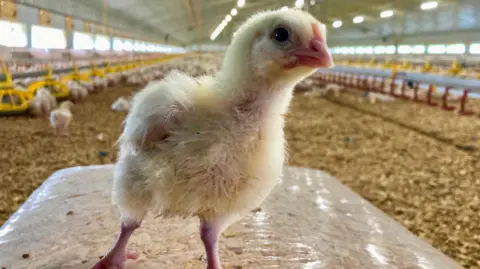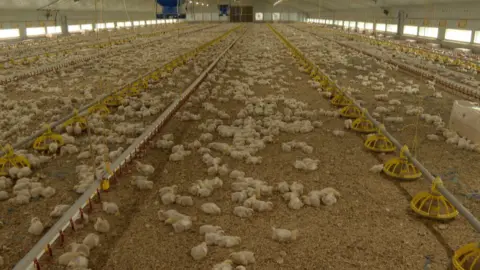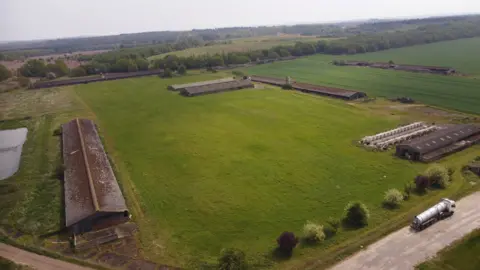What would a 'megafarm' mean for a village?
 Robby West/BBC
Robby West/BBCPlans to build one of the UK's largest industrial farms have been submitted.
Food producer Cranswick wants to expand an existing site so it can rear millions of chickens and tens of thousands of pigs a year in Norfolk.
It says the proposal, described as a megafarm, in the village of Methwold would help to deliver affordable food but people opposed to the proposals say it is not suitable for the area.
A decision is expected in summer 2024 and as the council considers the application. What has been proposed?

What plans were submitted?
Cranswick wants to increase the size of a farm on land that was previously an RAF base.
The company bought the site five years ago and there has been a farm there since the 1960s.
Plans, lodged with West Norfolk Council, showed the company wants to pull down existing poultry sheds and build 20 new ones to house 870,000 chickens.
It also wants to create 14 new buildings for 14,000 pigs and accommodation for people working on the site.
Cranswick supplies meat to major supermarkets and the company said the new site was needed to keep up with demand.
The company, which employs 14,000 people across the UK, said the project would create a sustainable and modern farm helping to deliver affordable food.
 MARTIN GILES/BBC
MARTIN GILES/BBCWhat do residents think?
Campaigners opposed to the plans claim it would cause a huge increase in traffic on surrounding roads and fear it could create pollution and bad smells.
Two people who live nearby have set up the Cranswick Objection Group to lobby against the proposals.
Co-founder Shirley De'Ath, 61, moved to the area three years ago from London and worries the local road infrastructure would not cope with a farm of this size.
She said the increased traffic would "run right past my house" and the condition of the roads would create issues for local commuters.
“Why are we allowing mega-farms to go ahead? …this is the wrong thing to do for this country.”
She is concerned smells released from animal slurry would affect the people living in the surrounding area as well.
"Big operations like this produce an awful lot of waste material," she said.

When asked if the group's objections to the plans were based on the proximity to their homes, co-founder Denise Charlesworth-Smith said: "Maybe it is nimbyism."
But she added the area was "famous for tourism" and the farm could deter visitors.
What does the company say?
Cranswick's managing director for East Anglia, Barry Lock, said it wanted to modernise the site to feed a growing market.
"The consumption of meat in the UK is increasing year on year... to ensure we still have UK food on UK shelves, we need to continue to invest in UK agriculture," he said.
He added the site would be developed "under modern standards to ensure we are achieving best welfare".

Asked about a potential increase in traffic to the local area, he said the site would have one-way systems to avoid lorries going through local villages.
The company said it had worked with National Highways and the increase in traffic was "not considered to be significant".
Mr Lock said an environmental permit for the site was in place as the site was already a farm.
When asked about environmental impact, he said the company would "always complies with the regulations".
"All of the pollution controls will be installed to the best available techniques and in line with environmental standards," he said.
How will the chicken and pigs be treated?
Animals on the new site would all be farmed under Red Tractor and RSPCA Assured Standard, the company said.
Marketing director Andy Napthine added the company was "fully audited" by both schemes.
"We have always put animal welfare as the number one priority for the business," he said.
Animal rights activists have lodged objections against the planed new farm.
Several national organisations, including PETA, have encouraged supporters to write to the council and object to the proposals.
PETA vice president Elisa Allen said that if council officials saw "the terrified animals and smelled the putrid stench of ammonia and faeces", they would refuse to grant planning permission.
Who else objected?
The boss of the vegetarian food producer Quorn has also criticised the plans, saying the farm could pose a risk to public health.
Its CEO, Marco Bertacca, wrote an objection letter to the council and raised concerns the industrial-scale farm could create breeding grounds for diseases.
Quorn has one of three manufacturing sites in the area.
"Recent outbreaks of bird flu and other diseases in the region highlight these concerns," he wrote.
Follow East of England news on Facebook, Instagram and Twitter. Got a story? Email [email protected] or WhatsApp us on 0800 169 1830
